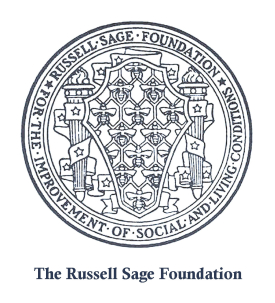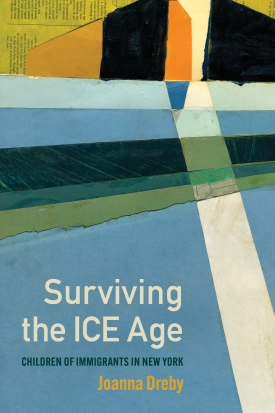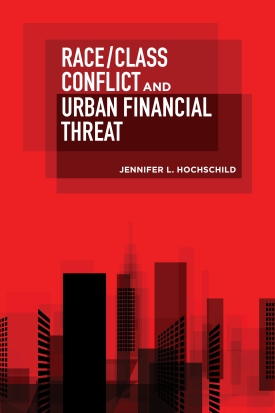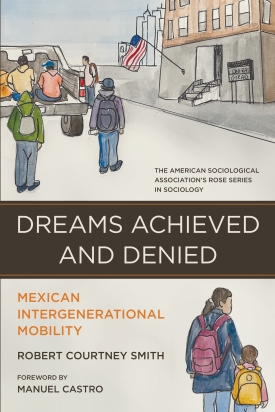“Throughout her distinguished career as one of the nation’s preeminent social policy scholars, Jennifer Hochschild has drilled down to the bedrock of society to expose the race- and class-based inequalities that undergird much of American life. Now, in her latest study, Race/Class Conflict and Urban Financial Threat, she takes us through four fascinating case studies in the cities of New York, Atlanta, Los Angeles, and Chicago, to explore with precision exactly when, how, and why race and class do—or do not—drive the creation and implementation of major public policy programs, from policing to housing, education to retirement funding. The framework she devises for analyzing these programs not only helps to unlock an important public policy puzzle; it will go a long way toward helping a rising generation of urban leaders to be more aware in shaping a future that will be more just and inclusive for all.”
—HENRY LOUIS GATES JR., Alphonse Fletcher University Professor,Harvard University
“Jennifer Hochschild deserves our admiration for her commitment to combining a passion for justice with rigorous scholarship and a resolutely realistic view of how urban politics works. All these virtues are on display in Race/Class Conflict and Urban Financial Threat. Understanding the relationship between race and class conflicts is hard enough. But understanding both in the context of the financial challenges facing big cities is an enormous contribution to solving problems—and to being honest with each other about the stakes in some of our most divisive public policy battles.”
—E.J. DIONNE JR., W. Averell Harriman Chair and Senior Fellow, Governance Studies, The Brookings Institution
“Returning inventively to a prior generation’s attention to pluralism in urban settings, this book’s conceptually focused cases of policing, development, pensions, and education illuminate when, how, and why deeply inscribed inequalities of race and class shape policy creation, goals, and implementation. Stressing the importance of variations to substance and location, Race/Class Conflict and Urban Financial Threat powerfully shows that core hierarchies of inequality are not fixed, constant, or always dominant as causes.”
—IRA I. KATZNELSON, Ruggles Professor of Political Science and History,and deputy director, Columbia World Projects, Columbia University
Race and class inequality are at the crux of many policy disputes in American cities. But are they the only factors driving political discord? In Race/Class Conflict and Urban Financial Threat, political scientist Jennifer L. Hochschild examines significant policies in four major American cities to determine when race and class shape city politics, when they do not, and what additional forces have the power to shape urban policy choices.
Hochschild investigates the root causes of disputes in the arenas of policing, development, schooling, and budgeting. She finds that race and class are central to the Stop-Question-Frisk policing policy in New York City and the development of Atlanta’s Beltline. New York’s Stop-Question-Frisk policy was intended to fight crime and keep all New Yorkers safe. In practice, however, young Black and Latino men in low-income neighborhoods were disproportionately stopped by a predominantly White police force. The goal of the Atlanta Beltline, a redevelopment project that includes public parks, new housing, commercial development, and a robust public transit system, is to expand access around the city and keep working-class residents in the city by constructing affordable housing. Instead However, the construction completed thus far has also encouraged gentrification and displacement of, displaced poor, disproportionately Black residents, and has increased the wealth and power of both Black and White city elites.
However, Hochschild finds that race and class inequality are not central to all urban policy disputes. When investigating the issues of charter schools in Los Angeles and Chicago’s pension system she identifies a third driver: financial threat that feels existential to the policy and political actors. In Los Angeles, there is a battle between traditional public schools and independent charter schools. Increasingly, families with sufficient resources are moving out of L.A. to areas with better school districts. Traditional public schools and charter schools must fight for the remaining students and the funding that comes with them, since they fear that there There are not enough students to teach and not enough money to teach them. The school district risks school closures, layoffs, and pension deficits; in this context, race/class conflict fades into the background.
Chicago’s public sector pension debt is at least three times as large as the city’s annual budget and continues to grow. Policy actors agree that the pension system needs to be stably funded. Yet city leaders, fearful of upsetting constituents and jeopardizing their political careers, fail to implement policies strong enough to do so, except by penalizing new workers. Meaningful policy change to rectify the pension deficit continues to get kicked down the line for future policy actors to address. In this context also, race/class conflict fades into the background.
Race/Class Conflict and Urban Financial Threat is a compelling examination of the role that race, class, and political and fiscal threat play in shaping urban policy.
JENNIFER L. HOCHSCHILD is Henry LaBarre Jayne Professor of Government, Professor of African and African American studies, and Professor of Public Policy, Harvard University




